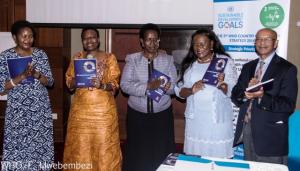WHO Uganda launches the 3rd Country Cooperation Strategy 2016-2020
November 2016 - The Minister of Health Dr. Jane Ruth Aceng officially launched the 3rd World Health Organization (WHO) Country Cooperation Strategy (CCS) noting that it is well aligned with government priorities as outlined in the Health Sector Development Plan (HSDP) 2015/16 - 2019/20 and the Second National Development Plan (NDPII) 2015/16 – 2019/20.
“Thank you WHO for a good document. I am glad that as Director General I participated in developing it and now as Minister, I am launching it” she said at the national launch held at Sheraton Kampala Hotel. As DG, Dr Aceng led the Ministry of Health Top Management team that contributed ideas that helped to shape the CCS priorities for Uganda.
The WHO CCS is a medium term strategic document that defines a broad strategic framework for WHO’s work with member states. It articulates a clear vision on how to improve the effectiveness, efficiency and quality of WHO’s work in member states with the ultimate aim of making the greatest possible contribution to health and development outcomes. The CCS will guide WHO’s work in Uganda for the next five years.
Dr Aceng particularly talked about Non Communicable Diseases, human resources for health, health systems development, governance and leadership issues, control of disease outbreak and maternal child health as some of the areas that require scale up of public health interventions targeting the general public. She thus thanked WHO noting that the CCS articulate a clear approached to helping Uganda tackle these problems.
The 3rd CCS has five Strategic Priority Areas of Cooperation with Uganda. They are; Strengthening national capacity to promote health security for the population of Uganda; strengthening partnerships, accountability and government leadership for health; supporting scale up of essential health services for communicable diseases; strengthening multi-sectoral approach for addressing Reproductive, Maternal, Newborn, Child and Adolescent Health (RMNCAH) and Social & Environmental Determinants of Health; and strengthening health systems for effective service delivery including Non-Communicable diseases.
Speaking at the same function, the UN Resident Coordinator Miss Rosa Malango pledged continued UN commitment to supporting the government of Uganda to achieve the 2030 Agenda, the Vision 2040 and the NDP. She urged WHO to do more work on NCDs and road traffic accidents that account for a big number of deaths in the Uganda.
The outgoing WHO Representative Dr Wondimagegnehu Alemu reported that the CCS is an approach that lays out WHO’s work at country level. He explained that this is a new requirement for all WHO country offices in line with the restructuring process of the organization and the Transformation Agenda. He added that WHO will continue giving technical advice to the government of Uganda whenever required, to coordinate partnership response especially during emergencies and to implement interventions that are well aligned to the government’s development agenda. Dr Alemu used the opportunity to bid the country farewell as his duty tour comes to an end.
WHO Country Cooperation Strategy Uganda, 2016–2020 (6.67 MB)



